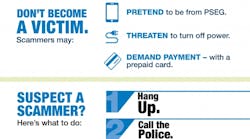According to the U.S. Federal Trade Commission, more than 3 million consumers filed fraud complaints last year. Phone scams are among the most common complaints. To combat these con artists, Public Service Electric and Gas Company (PSE&G), New Jersey's largest utility, joined forces with more than 80 energy companies across North America to educate people how to spot a scam. The collaborative designated the third Wednesday in November "Utilities United Against Scams Day."
How the most common payment scam works:
- Someone pretending to be a utility employee calls and threatens shut-off within an hour if they do not receive immediate payment via a prepaid card.
- Victims are given a phony phone number to call back after they purchase the cards from a retail store.
- When the customer calls back, they may hear voice response prompts that mimic those they would hear when calling a real customer service line. Some of these criminals use caller ID spoofing technology to replicate PSE&G's number.
- A fake representative asks for the numbers on the prepaid card or receipt. Within seconds the money is gone.
Scam red flags:
- The caller becomes angry and aggressive, telling the customer his or her account is past due and service will be disconnected if a large payment isn't made – often within less than an hour.
- The thief specifically demands the customer pay with a prepaid card or wire transfer.
"If a caller directs you to go to a local store to purchase a prepaid card to pay your bill, it is likely a scam," said Greg Dunlap, PSE&G vice president of customer operations. "If you receive a call and are in doubt, hang up and call us at the phone number listed on our website or your PSE&G bill."
The only way to protect against these scams is for customers to be cautious. Before terminating service, PSE&G alerts customers in a number of ways: messages on their bill, letters and phone calls. While the utility accepts credit cards, prepaid cards and money transfers to pay bills, PSE&G would never demand a specific type of payment and threaten immediate service termination.
"Hiding behind an untraceable phone, scammers know it is doubtful they'll be caught," said Dunlap. "By educating people how to spot a scam, our Utilities United collaborative aims to spare many would-be victims and make the thieves' underhanded jobs a lot harder."



